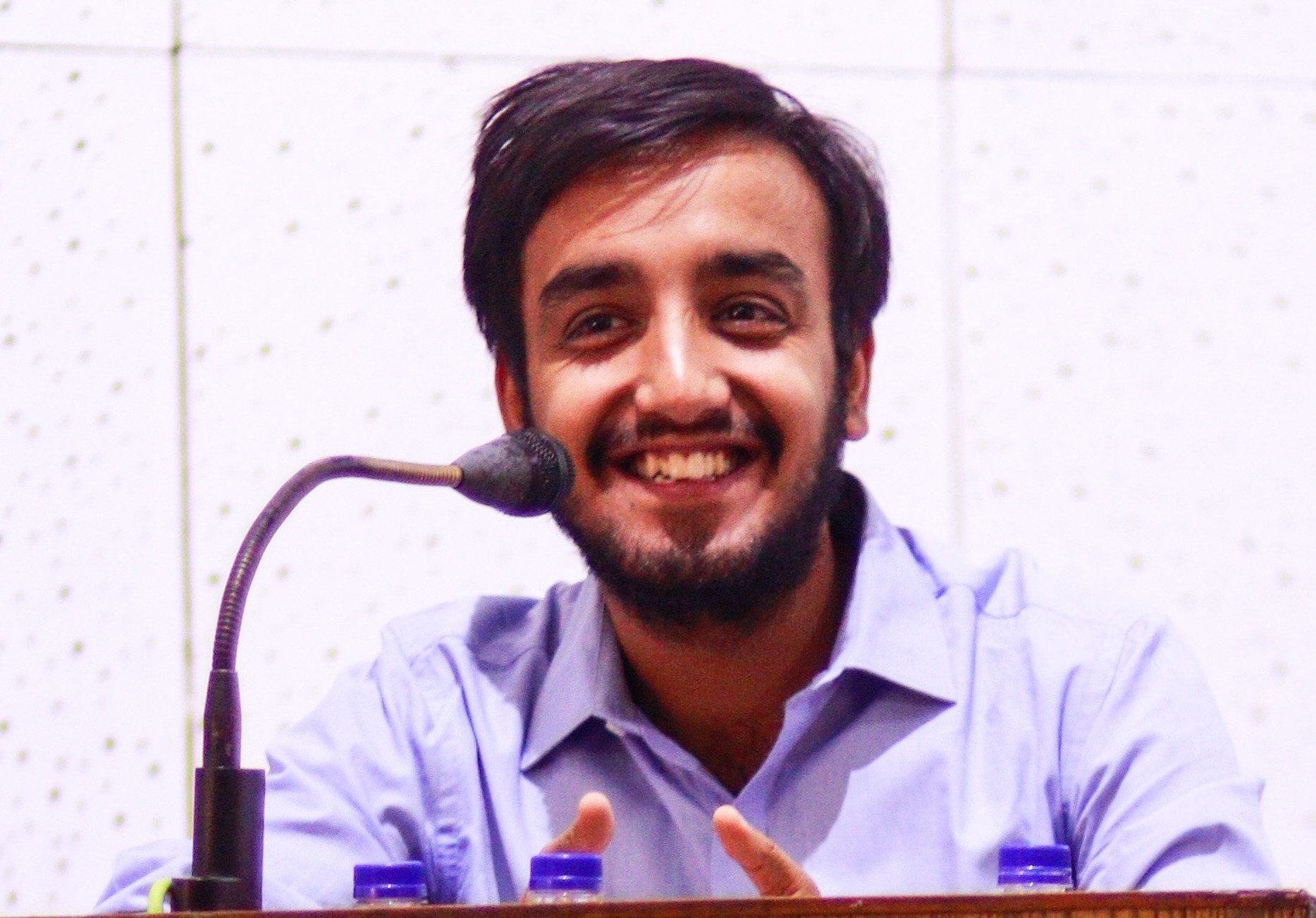Interview with Aditya Arora, CEO Faad Network
CBS Alum talks about angel investing, startup-funding, his college life and more.
How was your college life like at CBS? Did it help you in becoming the person that you are now?
I spent two years in East Delhi Campus. In the first year, I gave all society auditions and made some really good friends. Second year was more or less settling down in terms of friends and society groups. I also made friends with our professors. In third year, the travelling hustle got pretty relaxed as we shifted to the Rohini campus. It was an overall good and enriching experience at CBS.
You have been an active blogger and TEDx speaker . How does it help you in sharing your thoughts with other people and in connecting with them?
Humans are the best book you can read and you can learn from their experiences, mistakes, success and failures. No book can really teach you all that, andconnecting with people beyond their achievements is very important. People saw my work and wanted to know my insights of preparation. My first TedX was at BPIT College. Helping and mentoring people is the least we could do for others both personally and professionally!
How does it feel being the “Youngest Nominee for Padma Shri 2020” just after 2 years of completing undergraduation?
If you asked me if I realised every day that I was hitting those milestones, I would’ve said no to it. Because once I do, I’ll start jumping in the air and probably never stop! I love this thought by Ishita Katiyar at one of her TED talks, “Where do you see yourself 5 years from now?” and she used to always say that what is stopping her right now from achieving that? Why do I have to wait for 5 years to get that?
Being a Padma Shri nominee is extremely big and the highest level of validation and gratitude you can get. So I’m just accepting it as it comes.
What are your early experiences in entrepreneurship and pitching that led you to establish such a diverse network of Venture Capitalist? How vital CBS was in this journey?
When I would say I’m from CBS, it left a good first impression but the second impression was that I’m still a student! In the Venture Capital industry everyone in the room was probably in their late 30s / early 40s. I preferred to be an investor and learn more from them – what drives them to put capital in a startup which is not a BSE 500 Company, not a NIFTY company where you can get the drawdown analysis. The very first 2 years in Faad, I executed only 5 investments in 2 years which is not a good margin at all. But in the last 4 months, I’ve almost done 12 investments. That is the kind of learning I’ve got.
Would you call Faad an Angel Network or is it just individual Angel Investors separately funding startups?
It is an Angel Network. We have 350+ investors, HNIs, VCs who are actively investing with us. We have people who are heading IPL teams and are CEOs. We pitch about 36 startups and aim to close more than 20 deals that shows our credible and growing record.
Just like every other Angel Network in India, Faad gets one name on the cap table. Let’s say Faad invested 50,000 to get our name on the cap table, and whatever investors that invest through us, get their individual names on the cap table. Unless and until we become a fund, we can’t get this. We try to do an LLP structure. In fact, we have it in one of the deals: we formed an LLP of all our investors and that LLP has come on the cap table.There is no regulation on this in India and that is something we don’t want because a Partnership model is always very tricky in a business.
In a recent interview, you mentioned that you intend on setting up an early stage investment fund rather than just being an aggregator with a network of investors. How is that investment fund coming along? Have you directly invested in certain startups?
We probably want to launch a fund in the next couple of years which will start at least 10 Mn USD. Right now, we have put in our capital in one of the early-stage investor funds. It’s a marquee fund – backed by one of the leading accelerators and investing entities in India. We’re looking for co-investors in our fund wherein we can just log into someone else’s fund and run a dummy fund of our own and all the compliances are taken care of by the Principal Fund Partners. Once we’ve gotten about 35-40 companies and sufficient cash – because in a fund you have to put in your own money as well, there’s a 2.5% management fee – that’s when we’ll go and launch a fund.
As the nature of your business demands taking extremely high risks, how do you prepare or mitigate such risks? Do you have a specific exit strategy in case of a failure?
We don’t encourage investors to put more than 5% of their portfolio value in start-ups as the risks are high and exit becomes difficult when a start-up reaches the point of saturation. Even the Angel Investors by their virtue understand that they have to act like an angel to these ideas and help them grow. We involve informed and strategic investors rather than the volume of investors. We also invest in start-ups to show a note of confidence to the investors.
9 out of 10 start-ups fail in India but the one that succeeds gives bumper returns and compensates the losses of the others. That is how portfolio diversification 101 works.
How did (Dr.) Dinesh (Singh) and Karan (Verma) envision Faad Network, and when did you get on-board with it?
It was like a perfect after-office story where the co-founders of Faad used to meet for beers and just discuss casually on what to do next. They thought of a name called Faad, bought the domain name and held it for one year but they did not know what to do with it!
I joined Faad as intern through CBS and never predicted that from an intern at Faad company I’d become the CEO.
Initially, it started as a one-stop solution to help entrepreneurs. We were doing everything in the room that you can think to help an entrepreneur. In 2017, we realised that you can’t help startups with everything. It’s like diluting your brand if you open up a multitude of services. The very first investment we made was in ClearDekho.com, which is now India’s leading budget eyewear retail brand. We invested in them when they had one store in Delhi-NCR. It was like a traditional business, and we already had Lenskart which was our biggest rivalry. It took us 6 months to close that transaction and once that transaction ended we thought, we wanted to be the money guys!
How has the scenario of startup funding changed since the pandemic has dawned?
There are about 1200 angel investors in India out of which only 5% are active. But there are 60,000+ start-ups in India which require funding. As the demand-supply mechanism is not favorable to start-ups, we are conducting master class sessions and inviting guests who aren’t part of our network. We have converted around 50+ people into active angel investors with a conversion rate of roughly 50% through our sessions.
We’ve almost done half a million USD+ in investments in the past 4 months. We haven’t met for a meeting and everything is done online. That’s the new normal and that has helped us to drive things faster.
Have you noticed a common fashion with early-stage startups that gives/loses an edge while trying to acquire funding?
There are 5 Ts that every investor looks for in a start-up ecosystem;
- Team, which is the most important factor. My strategy is very clear. I back the team. My point is to take them from 70 to 100. So if they’re 70, I’ll probably accept that. Even if they are 50, I’ll probably accept that too but I’ll get a much larger equity stake for doing that. Entrepreneurship is a very difficult journey. So my only thesis is that the people shouldn’t give up easily when results don’t work out in their favour.
- Traction, which is basically how a business performs. If you are a revenue-making company, what sort of gross topline numbers you have in terms of Revenue, EBITDA PAT Margins etc.
- Target Market- Even if you’re the best in your market but it’s a very small market: probably investors don’t want to fund that, because then the value to which your startup can grow would be very limited.
- Ten-Times potential, that’s how the interest generates. Always remember that there is a 30% tax cut straight on your investments, and once a company announces investment there is a 50% DDT (Dividend Distribution Tax) as well which is now applied on corporates. Always make sure that if you make 10x, then you probably get a 6x or a 7x return, which is a very healthy return for someone who is investing for about 2 years.
- Terms. Investing terms primarily. What sort of an equity stake am I getting in that? What sort of exit terms the startup has? Will it come as an acquisition or a future fundraising?
What is your message for the students who wish to choose the road less traveled by and aspire to pave their own path in the future?
Even a competitive exam gives you some sense of choice and you solve it using elimination and trial & error. But in life, students usually restrict themselves to very few choices. A lot of people think that MBA and job are binary and the only popular and therefore the right choices.. But that choice might not be right for you. I even tried stand up comedy in a lot of DU Colleges and Crescendo in the third year and also maintained writing jokes and scripts as a hobby. Your CV won’t define your college life of your worth. Adjusting yourself to fit in that 1 page by minimising fonts or curbing your personality traits should not be the task. Differentiation and diversification of your personality and interests will always hold more value in career and life.




Comments